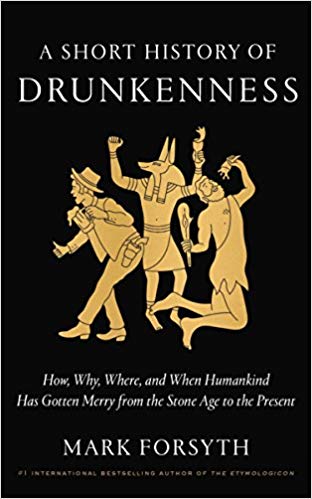A short history of drunkenness: How, why, where, and when humankind has gotten merry from the Stone Age to the present
By Mark Forsyth
2nd floor, New Arrivals, HV 5020.F67 2017

With the famously sodden holiday of St. Patrick’s day a-comin’ — not to mention Whitewater’s own upcoming Spring Fling — how could I not take a second look at this title? If nothing else, just to enjoy the delightful assortment of euphemisms (British, because of course Brits would have lots of euphemisms, and otherwise) employed for alcohol and getting drunk.
While taking on the undoubtedly universal human condition, author Forsyth still manages to find interesting cultural, historical, and sociological insights into how different cultures approached alcohol and drinking. For example: “The Sumerians saw it as a pure and jolly communal good, the Egyptians saw it as an extreme sport, but the Greeks stood back and stroked their beards and pondered. They developed theories and employed strategies.” (p. 53.) Sounds about right. Other fascinating things I learned:
- Among others, Muslim rulers of the middle east and the Aztecs apparently had very conflicted views about alcohol, alternately banning it fiercely and imbibing liberally
- There was no such thing as a teetotaling Viking – Odin, their supreme god, can be translated as “the drunken one”
- After Czar Ivan the Terrible thought it was a great idea to nationalize all the bars in the 1500s, Russian governmental solvency depended largely on the continued inebriation of its populace, and the people responded by executing the only ruler who made a serious attempt at prohibition (Nicholas Romanov, 1918)
- Maybe America’s silliest law, Prohibition, wasn’t really such a failure after all.
Where does one source such a history, one asks? Alcohol shows up surprisingly often in written records about celebrations, rituals, government procedure, etc. But for some of the earliest civilizations, Forsyth draws from origin stories, carvings or paintings, archaeological evidence, or sometimes the aphorisms or laws passed down through generations (as he points out, you only need to make a law or a pietistic decree against something if a lot of your comrades are already doing it.) This book is a rollicking, wide-ranging, and fun historical tour!

Quite a captivating look at how alcohol and inebriation shaped the history of humankind.